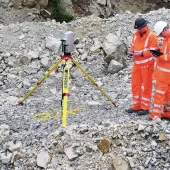MPA/RTPI conference focuses on long-term supply

2016 MPA/RTPI Mineral Planning Conference calls for long-term planning to enable sustainable growth
THE fact that more than 5 billion tonnes of mineral products are going to be required by the economy and society over the next 25 years, and the challenges and opportunities arising from an emerging UK mineral strategy provided the focus of the 2016 Mineral Products Association/Royal Town Planning Institute Mineral Planning Conference that took place in London on 18 May.
More than 180 delegates from 90 different organizations travelled from as far afield as Cornwall, Cumbria and Northumberland to attend, reflecting the widespread interest that exists around mineral planning issues across the country.
With non-energy minerals representing the single largest material flow in the national economy, a range of speakers provided perspectives around what the UK minerals sector requires to maintain its essential contribution to society in the short, medium and long term.
They included Barney Pilgrim from the Banks Group on the value of coal, Richard Hunt from Central M&W Planning on potash and polyhalite, Gary Staddon from Imerys on ball clay, and Jerry McLaughlin from the Mineral Products Association (MPA) on construction aggregates.
In addition, Richard Greaves from Essex County Council gave a planning officer’s perspective on how a mineral strategy will help give focus to the delivery of a steady and adequate supply of minerals, a legal update was provided by Martin Kingston QC and Nina Pindham of No.5 Chambers, and Michael Knight from Natural England spoke about Impact Risk Zones for UK European Protected Wildlife Sites.
Political will, adequate funding and clear policy guidance and direction were identified as recurring themes that are required to deliver the increased certainty and confidence required by the minerals sector.
The role and contribution of the minerals industry across society, in terms of the products it produces, the activities these enable and the wider socio-economic value this generates for the nation were also highlighted. Yet despite mineral products touching activities that comprise 16% of the national economy, general awareness around the role and importance of locally produced raw materials remains limited.
The conference also heard how changes to the balance of primary aggregate supply were likely to increase the strategic importance of key wharf and rail depot infrastructure, reinforcing the importance of effective safeguarding policies to protect these facilities. A users guide to wharf safeguarding was given by James Trimmer from the Port of London Authority, whilst Guy Bates from Network Rail gave a presentation on how rail freight serves construction.
MPA chief executive Nigel Jackson (pictured), who opened the conference, said: ‘A long-term industry needs a long-term plan. The mineral products industry is a significant and essential industrial sector that requires large investment in major operations for the long term.
‘Mineral planning is a good thing when done well, and can provide the certainty and confidence industry requires for the medium to long term. But to do this it is important that government resources and supports this key function properly, so that it can be an enabler for sustainable growth rather than an obstacle.’
The conference also heard how the UK Minerals Forum has played a useful role in helping to develop the background for a new industry-led strategy that is intended provide the foundation for demand to continue to be supplied ‘steadily and adequately’ for the next generation.









